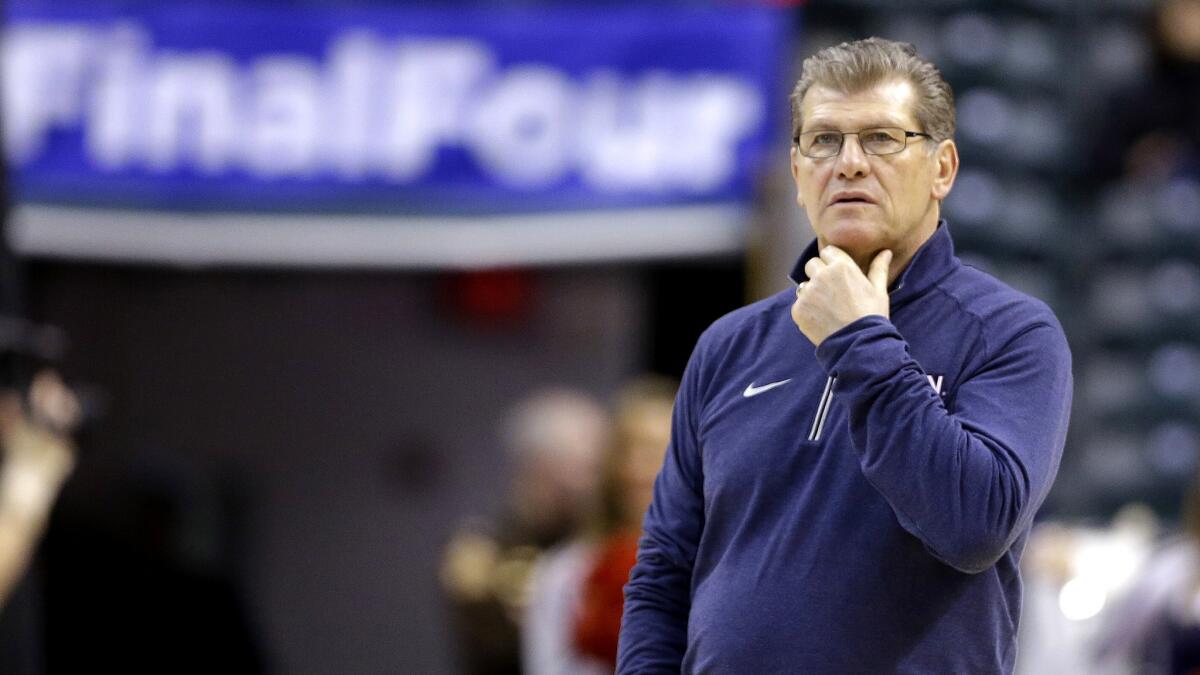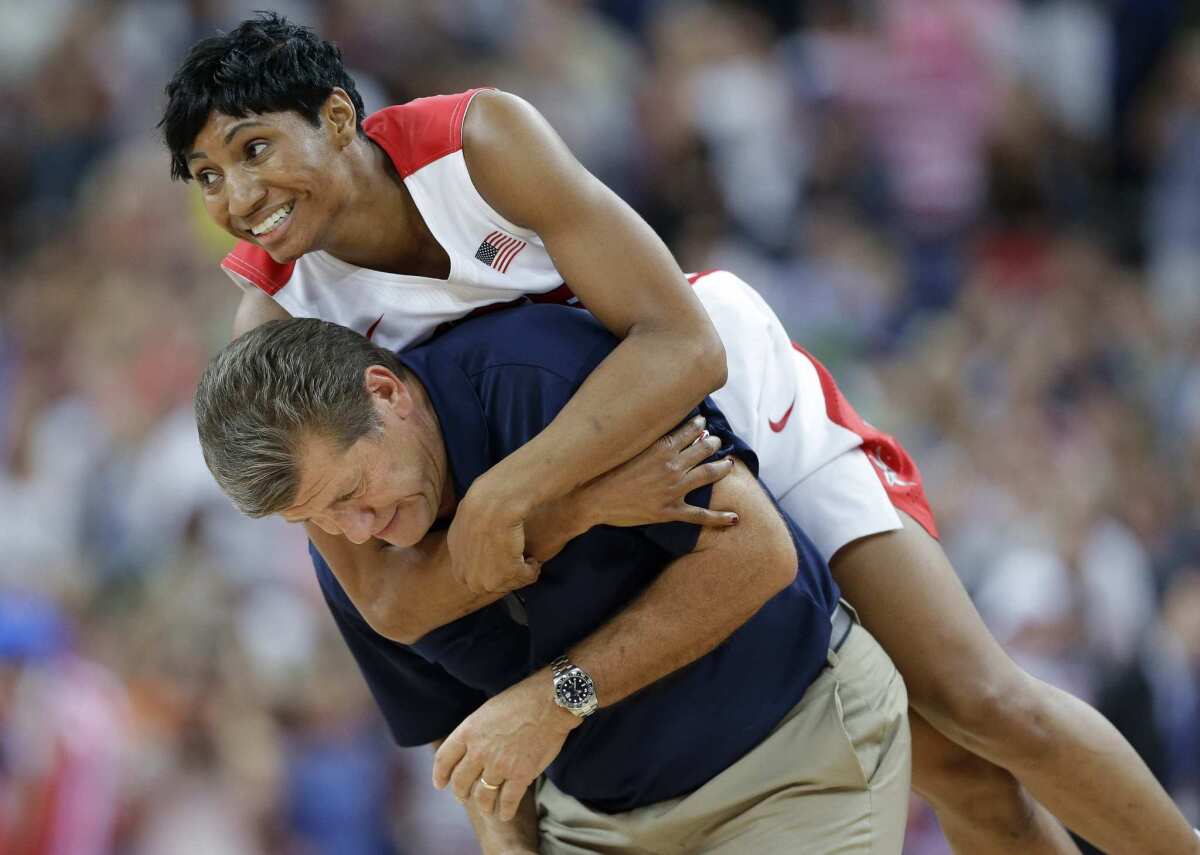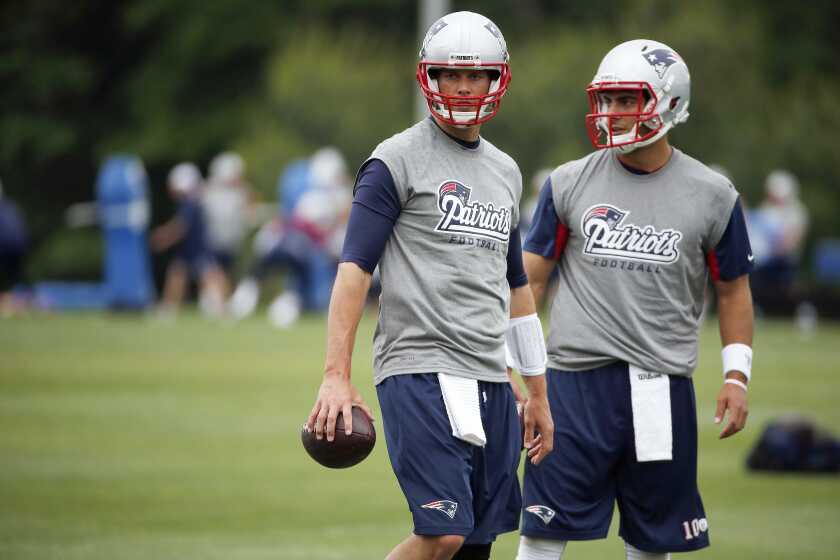Connecticut’s Geno Auriemma keeps making a case to be considered the greatest basketball coach

Connecticut Coach Geno Auriemma watches his team’s pracatice on Saturday in Indianapolis.
Reporting from Bridgeport, Conn. — The problem with chasing a legend is you never know when you’ve caught him.
Did Connecticut women’s basketball Coach Geno Auriemma catch former UCLA men’s coach John Wooden in 2011 when his Huskies won 90 consecutive games, two better than Wooden’s 37-year-old record? Did he pull even last week by reaching the Final Four for a ninth consecutive season, the same number as Wooden?
Or does Auriemma need to win an 11th national title, one more than Wooden, Tuesday in Indianapolis to cement his legacy?
Sal Buscaglia, who retired last month after 38 years and more than 700 victories as a women’s basketball coach, says Auriemma eclipsed Wooden long ago.
“He is the greatest coach in any sport in the history of sports,” said Buscaglia, whose career ended when his Robert Morris team suffered a 52-point loss to Auriemma and Connecticut in the first round of this year’s NCAA tournament.
A few skeptics see gender before greatness and have said Auriemma doesn’t compare because he coaches a women’s team.
“I’m always baffled by why, especially in basketball, everything has to be compared to the men,” Auriemma said. “I have never heard Serena Williams have to answer a question ‘Well, if you’re any good, why don’t you play Roger Federer?’ That’s not the point, is it? You just compete against the people you compete against. And that should be good enough.”
And no coach has been as good as the brash, outspoken Auriemma, whose team enters Sunday’s national semifinal game with Oregon State with a 73-game winning streak, the Huskies’ third run of at least 70 consecutive victories since 2001.
Over the last two seasons, Connecticut led the nation in scoring and defense, winning those 73 games by an average of more than 40 points. The Huskies’ only loss since 2013 came in overtime at Stanford; in every other game, Connecticut won by double digits — more than 100 times, they won by at least 20 points.
The Huskies have been so dominant that it is occasionally said that they have ruined the women’s college game.
Dan Shaughnessy, a Boston Globe columnist, caused a stir recently when he posted on Twitter: “Hate to punish them for being great, but they are killing women’s game. Watch? No thanks.”
UCLA Coach Cori Close disagrees, saying Connecticut has brought attention to the sport by establishing a level of excellence others must now strive to match.
“The way people talked about Wooden’s teams, and still talk about Wooden’s teams, is the way they’re talking about Geno’s teams right now,” she said. “Our entire game will be better in the long-term because of them, how high they have set that bar.”
Auriemma, 62, even built his program at Connecticut the same way Wooden did his at UCLA.
“My ‘Pyramid of Success’ is the same as his,” Auriemma said. “He got the absolute best players in America every year. We get the best players in America every year.”
See more of our top stories on Facebook >>
When Auriemma arrived at Connecticut in 1985, he inherited a program that had one winning record in its history. In his fourth season, the Huskies won 24 games and advanced to the NCAA tournament.
But the big change, the one that took Connecticut from decent to dynasty, came three years later, when it beat out dozens of suitors to land Rebecca Lobo. The recruiting pitch was simple, the All-American player recalls.
“He basically said, ‘You’ll get what you earn,’ ” Lobo said. “He was more honest with me than anyone else.”
By the time Lobo repaid that honesty with the school’s first unbeaten season and national title in 1995, the nation’s top high school players were crowding the rural two-lane road leading to the university’s bucolic campus at Storrs, Conn.
“The reason I went there is the same reason Diana [Taurasi] went there, the same reason Maya [Moore] went there, the same [reason] Breanna Stewart went there and all the players that have come in between,” Lobo said. “We wanted to play for him.”
Not that it was easy. Quite the opposite. The coach’s standards are high and his practices legendarily brutal.
“He is going to tell people how it is, whether that’s what they want to hear or not,” said Lobo, who retired as a player and is an ESPN analyst. “You have to be that kind of player to go there because once you step foot on campus, that’s what it’s going to be like every day for the next four years: Hearing the honest truth and having him hold the mirror up to you every single day.”
Auriemma, who stumbled into his profession after working two years as an assistant for the boys’ team at his old high school, never considered himself a women’s coach. A man who has coached women, yes. But the game is the same regardless of gender, he says, so he coaches his players the same way he would coach men.
In his view, the men’s game has morphed into a playground contest of stylized dunks, no-look passes and look-at-me bravado; the women still play basketball. Auriemma, who, like Wooden, considers himself a coach and teacher first, prefers it that way.

Angel McCoughtry jumps on the back of United States Coach Geno Auriemma after beating France, 86-50, in the women’s gold-medal basketball game at the 2012 Summer Olympics.
“We’re not jumping out of the gym. We have to develop skill and we have to depend on that skill,” said Tina Charles, who played on two unbeaten teams at Connecticut, then won an Olympic title under Auriemma in 2012. “So I think it’s the fact that we’re more disciplined, that we listen, that’s why he’s still on the women’s side.”
His old-school, fundamentals-first approach may have been born in the Old World. Auriemma, whose birth name is Luigi, spent his early years in a mountain village in Italy where his parents, both illiterate, lived in a tiny stone house with no water, electricity or heat.
When Auriemma was 7, the family took the well-trod migratory route also taken by the father of former Dodgers Manager Tommy Lasorda, leaving southern Italy for Norristown, Pa. As the eldest of three children — and the first to learn English — Auriemma became responsible for paying the bills, buying the groceries and explaining the outside world to his parents. (Auriemma, who can be seen singing the “Star-Spangled Banner” before games, became a U.S. citizen in 1994.)
The harsh upbringing shaped Auriemma, who stresses academics as much as athletics to his players.
Moore, who played with Charles on two NCAA champions and in the Olympics, said one of her fondest memories from her Connecticut days was when eight of the 11 players on the roster made the dean’s list and Auriemma honored them before a home game. Last spring, he went that one better, awarding a scholarship to Briana Pulido, a seldom-used walk-on guard and pre-med student from South Florida.
For Pulido, who was paying out-of-state tuition, the gesture was worth more than $40,000.
Get the latest in sports with our free newsletter >>
“He’s not doing this, coaching the way he’s coaching this year, because he wants his No. 11 [title]. He’s doing it because he wants Katie Lou Samuelson to get her first,” Lobo said. “He’s incredibly caring and he’s incredibly loyal.
“He loves his players and that is why they’re so loyal to him. I never felt like it was about him in his mind.”
How long Auriemma will continue coaching is a secret he’s keeping to himself.
“I’ve always been searching for the next thing, searching for … a whole other level than where we’re at right now,” he said. “And that’s good and bad, to be honest, because there’s a point in time where you need to be satisfied with how good you really are instead of always trying to be better.
“You know what I think my biggest strength is as a coach? That I’m way more demanding of my players than I am of myself. And it’s not really something to be proud of.”
Auriemma has two seasons left on a five-year contract that, with bonuses, is likely to be worth more than the five-year extension men’s Coach Kevin Ollie signed after winning a national title two years ago. But after starting a wine label and opening two successful restaurants, money is no longer a priority to Auriemma.
However, there is one summit he has not reached: Pat Summit’s NCAA record of 1,098 victories in 38 seasons as the women’s basketball coach at Tennessee.
Auriemma had a contentious relationship with Summit, but since she retired with early-onset dementia, the feud has thawed and Auriemma has donated to her charitable foundation.
Now Summit is the only legend left to chase. Auriemma has 953 victories in 31 seasons at Connecticut and needs probably five more seasons to catch her.
He would be 67 then, three years older than Wooden was when he walked away.
“I don’t want to think about that right now,” Moore said. “He’s still there and I want him to stay there forever. And I know all the girls would say the same thing.”
Follow Kevin Baxter on Twitter: @kbaxter11
More to Read
Go beyond the scoreboard
Get the latest on L.A.'s teams in the daily Sports Report newsletter.
You may occasionally receive promotional content from the Los Angeles Times.











